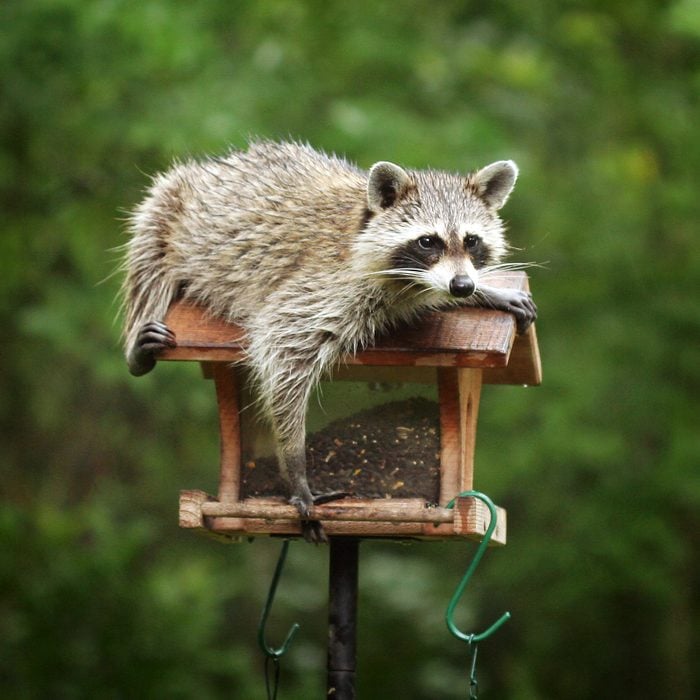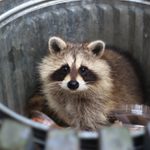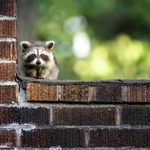What to Know About Raccoons in Your Yard

Raccoons are not fussy. They eat nearly everything and live almost everywhere. Here's what an animal expert recommends if you have them in your yard.
On Twitter the other day, I ran across a story about a Philadelphia woman who caught a raccoon lounging in her hammock. I once had a similar encounter with a mischievous band of raccoons at my California home.
Late one night, I awoke to creaking and squeaking sounds in the backyard. I turned on the porch light to discover a family of raccoons (aka a nursery or gaze) having a grand old time on my son’s playground set.
On top of seemingly enjoying swinging, we know that raccoons can also be curious, often rummaging through trash bins looking for dinner.
Did you also know raccoons are highly intelligent and dexterous? They can break into unlocked homes by turning doorknobs or flipping a latch on a dog door. And once in the kitchen, raccoons have been known to unscrew the lid from a peanut butter jar and other food containers!
Thomas Ward, a biologist/training specialist for Critter Control, offers insight into what a homeowner should do if they encounter one or more raccoons in their yard.
On This Page
Are Raccoons Rodents?
No. The common North American raccoon (P. lotor) is a nocturnal mammal belonging to the family Procyonidae. They’re distinguishable by their bushy ringtail and furry black markings around their eyes that look like a mask. It’s no wonder many people refer to them as the “bandits” of the forest.
Where Do Raccoons Live?
“Raccoons live across the United States and thrive in a variety of habitats,” says Ward. They particularly like woodland areas near water sources like streams, marshes and rivers.
Because of their adaptability, they fair just as well in forested areas and grasslands as in urban areas, farms and suburbs. Ward claims raccoons have adapted to populated areas by learning to scavenge from garbage cans, gardens and crop fields.
Wild raccoons typically nest in tree cavities, rock crevices, underground burrows and the abandoned dens of animals like muskrat lodges. “In suburban areas, raccoons tend to use insulation in attics for nests or attics as denning sites,” Ward says. “They also take residence in sheds and other similar buildings, as well as crawlspaces and areas under buildings and decks.”
What Do Raccoons Eat?
The better question might be, what don’t raccoons eat? Because raccoons are omnivores, they have a diverse diet.
“In the wild, raccoons eat birds and other mammals, but prefer to hunt for easier meals, if they are available,” Ward says. “Some of their favorite foods include nuts, berries, insects and eggs. They also catch fish, shellfish, reptiles and amphibians if their den site is near a body of water.”
A raccoon’s diet depends, of course, on where they live. If you have one, they’ll use your bird feeder as a source of food.
Fun fact: Raccoons are hygienic creatures who like to wash their food before consuming it.
Are Raccoons Nocturnal?
Yes. Raccoons come out when the sun goes down. Looking for food — either through foraging or hunting for their prey — they have a keen sense of night vision and are incredibly fast on their feet. They can run at about 15 miles an hour.
Do Raccoons Hibernate?
No. Raccoons don’t hibernate, although they do sleep a lot more in winter.
Ward says raccoons enter a hibernating-like state called a “torpor” during the colder months. When the temperature drops low enough, raccoons take shelter, often denning under decks, in attics, or inside chimneys and fireplace flues. During this low-activity period, they use stored fat to sustain them until spring.
What Are Raccoons Attracted To?
Food, primarily. After that, safety and shelter.
The following are some of a raccoon’s favorite backyard “banquet” sources:
- Pet food left out overnight;
- Bird feeders and bird baths;
- Goldfish ponds;
- Chicken coops;
- Vegetable patches;
- Grubs under sod;
- Compost piles;
- Dumpsters and garbage cans.
Do Raccoons Attack People?
It depends.
“Raccoons are generally shy around people, but they are defensive fighters,” Ward says. If cornered, ill or protecting their young (kits), they may lash out or bite in self-defense. “It is especially unwise to approach a raccoon in your attic or other confined space,” Ward says.
Dogs and cats are especially at risk of being injured by a raccoon, so don’t leave your pets outdoors unattended after the sun goes down.
Are Raccoons Dangerous?
“Yes, raccoons can be dangerous,” says Ward. They’re strong with sharp claws they’ll use to defend themselves.
Raccoons are also known rabies vector animals, according to the Centers for Disease Control and Prevention (CDC): “In the United States, rabies is mostly found in wild animals like bats, raccoons, skunks and foxes.”
Ward also cautions a raccoon in your house can introduce several diseases. A parasite called raccoon roundworm grows in their feces and can spread to pets and people.
Caution: If you come across a raccoon that appears unwell, call your local animal control officer immediately.



